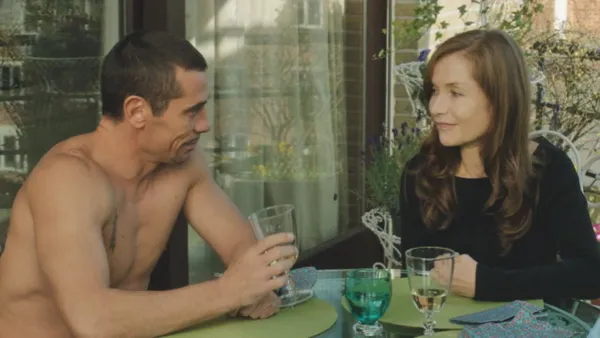Eye For Film >> Movies >> Abuse Of Weakness (2013) Film Review
Abuse Of Weakness
Reviewed by: Anne-Katrin Titze

Catherine Breillat's Abuse Of Weakness (Abus De Faiblesse) is a fantastic, heavy-duty tour-de-force. It all begins with everybody's most terrifying nightmare. Maud, played by Isabelle Huppert who is formidable in every scene and gesture, wakes up one morning under fresh white sheets and notices that there is something wrong with her left arm. She tries to get up and collapses. It takes all her strength to reach the phone. "Half my body is dead," she says and realises that "nothing will ever be the same."
Brain hemorrhage, emergency room, Breillat shows from her own experience with having suffered a stroke and the camera tells of the hospital and the patient's progress in a tone that is unsentimental, poignant, free. Maud, a filmmaker by profession, has to start with baby steps to crawl out of the abyss.

Her eyes follow the doctor's finger, she can't tell the color of the balls he is holding up for her, she, a woman whose apartment we later see is filled with bold works of art, every corner speaking of colours and textures. The tapestry of her world was struck down and her soul went into battle. Now, she cannot draw a clock with the numbers any more. She is progressing slowly and tells the speech therapist in one of the most potent hospital scenes on film what is missing. "I would like to laugh. I very much like to laugh."
Huppert heartbreakingly continues with expressive "ee" and "oo" sound exercises. Her family, among them her pregnant daughter (Daphné Baiwir), her friends and her colleagues are not there even when they are there. Huppert's character and Breillat in a cameo cross paths in the hospital corridor, as though the director passes on the baton of understanding to the film and to us in the audience. Everything is different now.
Once back in her home, the central story begins, again not far from the director's real life encounter with convicted swindler Christophe Rocancourt, whom she took to court and defeated in a well documented case of "abus de faiblesse," the legal term she chose as the title of her film about lucidity and identity.
Breillat follows up brilliantly on the fairy tale promises from her previous two films after her stroke, The Sleeping Beauty (La Belle Endormie, 2010) and Bluebeard (Barbe Bleue, 2009). She named her character Vilko in honor of Vilko Filac, her cinematographer on Bluebeard. A sleeping beauty, Maud is about to meet her Bluebeard.
Maud sees a man being interviewed in a talk show on TV. She can't take her eyes off him. She calls her assistant in the middle of the night. She wants to cast this man, Vilko Piran (Kool Shen), in her next film. His "icy hangdog look," and the "bitter pride" of having spent 12 years in prison after a tortured childhood make him unlike any actor in her eyes. "I want him," she knows, and when she meets him at her apartment the battle of wills commences. He provokes her, jumps on her bookshelves, calls Nietzsche "my master," struts like a peacock, and tells her he will only star in her movie "if the ending is good."
Well, not to give away too much, blood, a shower, violence appeal to his sensibilities and Vilko agrees if he can hang around. What evolves is a dance of tenacities and vulnerability mirrored and held too tight for comfort. Their relationship, never a physical one, is chronicled by the cheques she writes. Her friends warn her "He's a killer," they say, "Get rid of him, he's a killer."
Reviewed on: 27 Sep 2013

















